|
|
|
Sort Order |
|
|
|
Items / Page
|
|
|
|
|
|
|
| Srl | Item |
| 1 |
ID:
123588
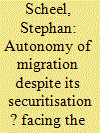

|
|
|
|
|
| Publication |
2013.
|
| Summary/Abstract |
This article reconsiders the concept of autonomy of migration in the context of technologically ever-more sophisticated border regimes by focusing on the case of biometric rebordering. As its name suggests, the concept of autonomy of migration's core thesis proposes that migratory movements yield moments of autonomy in regards to any attempt to control and regulate them. Yet, the concept of autonomy of migration has been repeatedly accused of being based on and contributing to a romanticisation of migration. After outlining two advantages the concept of autonomy of migration offers for the analysis of biometric border regimes, I demonstrate that processes of biometric rebordering increase the warranty of the two allegations, which feed this major critique. Drawing on examples relating to the Visa Information System, I show that processes of biometric rebordering alter the practical terms and material conditions for moments of autonomy of migration to such an extent that it becomes necessary to rethink not only some of the concept of autonomy of migration's central features, but the notion of autonomy itself. In the final section, I therefore point out some directions to develop the concept of autonomy of migration as an approach, which is better equipped to investigate today's struggles of migration without being prone to the critique of implicating a romanticisation of migration.
|
|
|
|
|
|
|
|
|
|
|
|
|
|
|
|
| 2 |
ID:
184309
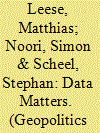

|
|
|
|
|
| Summary/Abstract |
Data matter more than ever in the regulation of borders and migration. An apt illustration of how movement is enabled or restricted by data collection and analytics was recently reported by Eyal Weizman, founding director of the London-based research agency Forensic Architecture that specialises in the production and analysis of evidence about human rights violations by state and corporate actors. Prior to a business trip to Miami where he was supposed to open Forensic Architecture’s first major exhibition in the US that, among other things, displayed investigations into a CIA drone strike in Pakistan and police killings of black US citizens, Weizmann was notified that his visa waiver request had been denied and that he would not be allowed to enter the United States.
|
|
|
|
|
|
|
|
|
|
|
|
|
|
|
|
| 3 |
ID:
168410
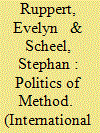

|
|
|
|
|
| Summary/Abstract |
Statisticians are under pressure to innovate, partly due to shrinking budgets and the call to do more with less, but also due to technological advances and the emergence of new actors promising to produce more accurate and timely statistics with what has come to be known as “big data.” This raises the question, how do new forms of data and methods become legitimate and official? We approach this question by conceiving of official statistics as part of a transnational field in which different factions of actors compete and struggle over the authority to innovate the data and methods that are legitimated to produce official statistics. We consider these struggles as a politics of method that is not reducible to a competition between ideas and words. They are also material insofar as they feature competing digital devices mobilized to demonstrate the validity of new data and methods. Through two empirical examples, we identify the strategy of reassembling methods to capture how statisticians tame and contain innovations based on big data, especially those introduced by data scientists, by integrating and simultaneously subordinating them to existing methods. By doing so, we suggest that reassembling is an innovation strategy that secures the relative position of national and international statisticians within the transnational field of statistics.
|
|
|
|
|
|
|
|
|
|
|
|
|
|
|
|
| 4 |
ID:
188514
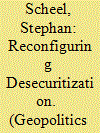

|
|
|
|
|
| Summary/Abstract |
This article introduces desecuritization as the missing supplement of the conception of securitization as a dispersed social process. It calls for the creative development of approaches that destabilise the credibility of security professionals’ claimed expert knowledge. To illustrate the potential of this approach, the article combines insights from the sociology of ignorance (agnotology) and the autonomy of migration literature to deconstruct the framing of migrants as cunning tricksters, a narrative that features prominently in processes of securitization. Within the Schengen visa regime discussed in this article, the trickster narrative emerges in the portrayal of visa applicants as deploying various modes of deception like ‘document fraud’ or ‘visa shopping’. Based on ethnographic fieldwork at consulates in North Africa, this article demonstrates, in contrast, that practices like applying at a consulate known for a more liberal decision-making practice constitute coping strategies by which migrants try to mitigate the uncertainty that a culture of suspicion, the discretionary power of consular staff and the heterogeneity of opaque decision-making criteria create for them. Ultimately, the analysis shows that security practices produce not only knowledge, but also various forms of nonknowledge which provoke the instances of ‘trickery’ that ever more pervasive security practices are supposed to forestall.
|
|
|
|
|
|
|
|
|
|
|
|
|
|
|
|
| 5 |
ID:
189391
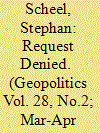

|
|
|
|
|
| Summary/Abstract |
Digital information and identification technologies offer state authorities new means for rendering individual subjects and entire population legible. Based on fieldwork at a migrant reception centre in Berlin, this article investigates how migrants hitherto unknown to authorities are translated into re-identifiable, governable subjects with the help of various digital devices. Conceptually, the article complements a sociology of translation with a vocabulary of treason to better account for coercion, force and violence as well as instances of resistance, friction and break-down in the assembling of related socio-technical networks. It shows that such an ANT-inspired framework, while facilitating a radically situated analysis, allows for exposing larger strategies of power. Through a detailed analysis of migrant registration procedures the paper develops three interrelated arguments on the digitisation of border and migration management: First, processes of digitisation are not reducible to the securitisation of migration. They are interrelated with the logistification of migration management which revolves around a logic of efficiency. The link between the digitisation and the logistification of migration management resides, secondly, in authorities’ attempts to establish migrants’ traceability. This is accomplished through the production of biometric identifiers and the allocation of personal identification numbers (PINs) which function as spokespersons for migrants. The fact that migrants often have to contest accounts shared by these informants in future encounters with authorities highlights, thirdly, that the production of legibility by digital means involves significant degrees of ontological violence.
|
|
|
|
|
|
|
|
|
|
|
|
|
|
|
|
|
|
|
|
|